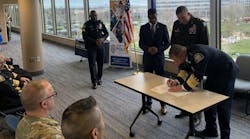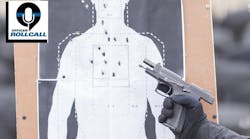Last summer, I sat on a friend's porch enjoying the late afternoon sun. We watched a local officer pull up and park just a little east of us. The deputy was sitting in his car with his window rolled down finishing up some paperwork when the sound of young voices came through the air. My friend and I stopped talking and listened. One voice rang above the others. The young man's voice hollered, "Pig!" followed by laughter. I leaned forward to see who this disrespectful kid was and almost fell out of my chair when he ran out from behind the tree he had hidden behind to yell at the policeman. It was my nine year old son.
I was horrified. Wasn't this the child who's father and step-father had been police officers? Wasn't his mother a criminologist who specialized in law enforcement and made a living interviewing and writing articles about officers all over the country and Canada? He had spent most of his life around cops, so what was going on? I called my son over and will never forget how wide his eyes got when he saw me. He knew I had heard. I asked him what he was thinking and why he chose to be so disrespectful. His answer, "That cop is always mean. He's not nice like the other one." I wasn't familiar with this new officer but knew the other one my son referred to. She really connected with the kids in town. She took the time to talk to them. I had spent time talking to her as well. She was hoping to retire and volunteer as a school resource officer (SRO) in our district. She had to wait until then because there wasn't any money to fund an SRO. Many of the kids, even the teenagers in our community like and respect her. This situation made me realize how important it is for officers to connect to kids.
Using a Holiday
Many police departments see the value in officers connecting with kids in the community. Popular holidays, like Halloween, offer a great chance for this interaction to take place. Agencies use a variety of methods to break down barriers and enhance relationships not only with the kids but also their parents. Last year, members of the Albuquerque (NM) Juvenile Probation Office hosted an event where they brought in candy and put together bags for several local organizations, including the Ronald McDonald House, Casa Esperanza, New Day Shelter, Amistad Shelter and Joy Junction. Due to funding restraints, these were the only treats many of these organizations received. Recently, in Paris (KY), the local police, U.S. Attorney's Office and FBI put on a children's party with face painting, contests and games. Their intent was to help kids learn more about officers. Another department using Halloween as a way to connect with community kids is the Midland (TX) police department whose community relations unit educates children on the dangers that surround Halloween and how to Trick or Treat safely during their Halloween Safety Program.
Connecting with Teen Citizens
A large variety of agencies offer a Citizens Police Academy. Designed to help bridge the gap between officers and members of the community, these academies allow citizens to become familiar with officer training, equipment and services provided. Also by having citizens interact with officers in a non-adversarial environment (most people only experience on-on-one contact with police when they've been pulled over or are a victim of a crime), each side has the opportunity to get to know the other as an individual. This alone breaks down stereotypes and barriers. It works the same way with teenagers. Many departments, from Palm Beach (FL) to Tucson (AZ) to Arvada (CO) offer a Teen Police Academy. During these academies, teens interact with officers, tour facilities and many get squad car and weapons demonstrations. The five week academy offered by Apple Valley (MN) Police Department hosts discussions including crime scene investigation and use of force. Officers and teens use this time to build relationships an important part of maturing and becoming good citizens.
Why Bother?
Officers have a lot on their plates. With budget crunches getting worse, often there are fewer officers on the street. Although the numbers aren't out yet, economic depression often results in increases in crime, therefore, calls for service. So, who has the time to deal with kids and why should officers bother? For several reasons, including being a role model, teaching respect for socially accepted authority and nurturing future police officers.
Many children do not have the fortune of being surrounded by positive role models. Even those who have loving guardians can benefit from respectful, responsible adults in the community. Officers are in a unique position to model healthy traits, such as self-esteem, physical wellness, safety and respect. Not every child will respond positively to an officer's modeling and many, unfortunately, are being taught disrespectful attitudes by friends and family, but this shouldn't remove the obligation to model from the officer. It might not seem to make a difference how you interact with a teenager, but your interaction might just be the experience that child holds on to and emulates.
Society has agreed to allow police officers to be agents of social control and authority. Every day officers are being held up to the standard of this role. Interacting with kids, especially in a setting like an academy allows officers to explain why society has tasked them with these responsibilities and how they carry them out. This helps remove the you're just a big bully with a gun attitude some kids have. Understanding of law enforcement's place in the social system can go a long way towards increasing acceptance and respect.
If police work is going to continue to grow and evolve, a new generation of officers must take the place of those before. Whenever officers host events or take the time to talk to kids in their community about what they do, they could be lighting the fire within them that eventually leads them to the academy and onto the streets themselves. Being approachable and answering questions about what you do and how you do it, could be the beginning of a child's desire to protect and serve.
Connecting with children is an important part of good policing. Officers who are open and interact with kids stand out in their minds and help develop their opinions of those who wear a uniform. As for my son, he was told to march back up to that deputy's car and apologize. I watched as he crossed the street, head down, and approached the window. Fifteen minutes later, he was still standing there, a smile on his face having a great conversation with a new role model.


